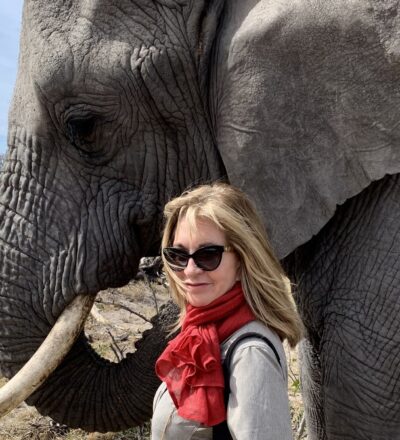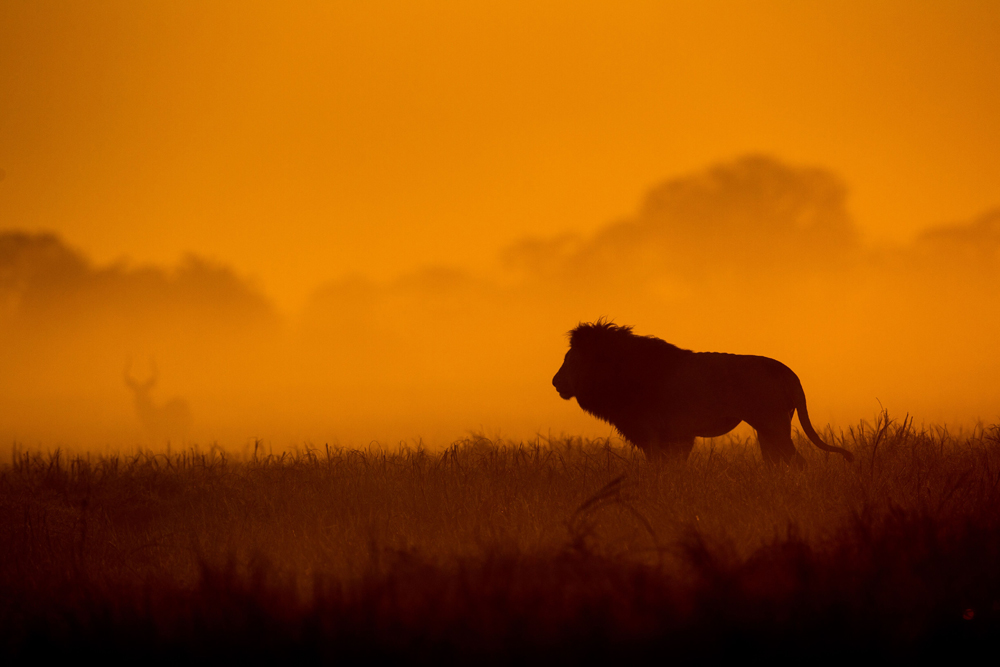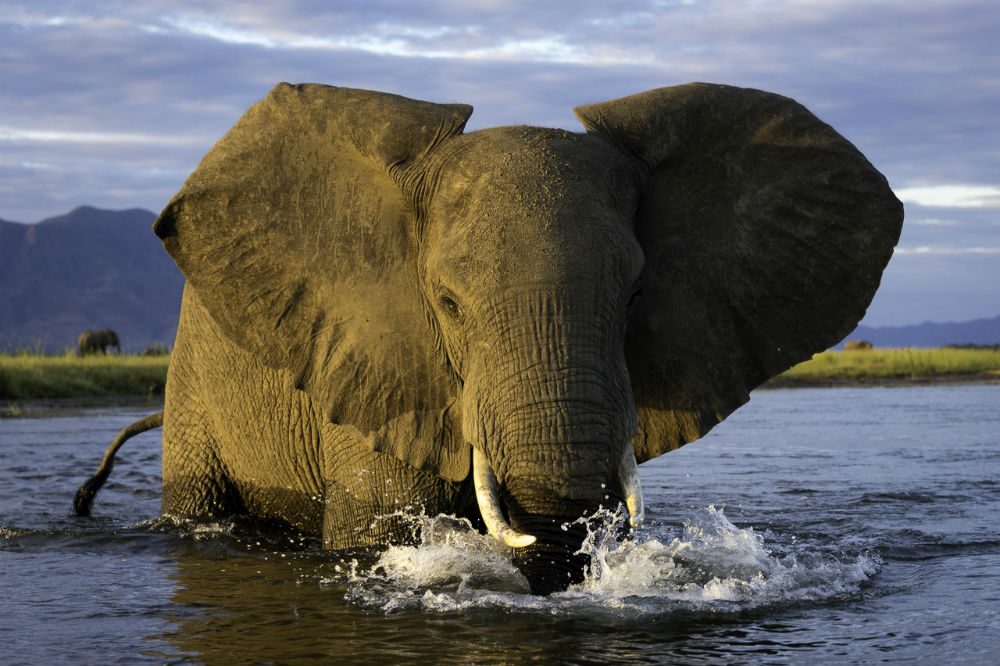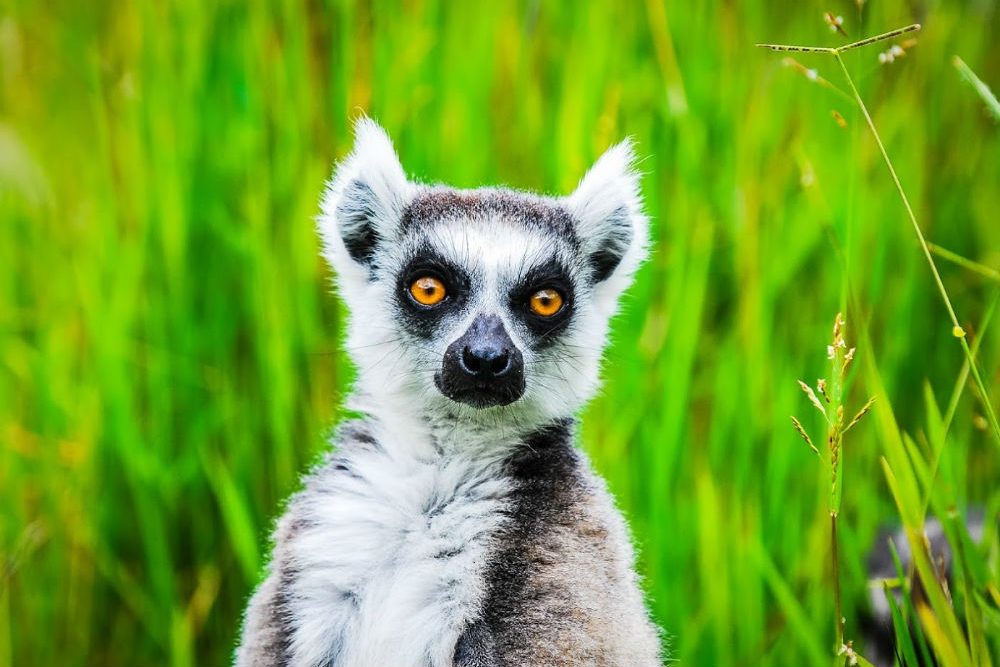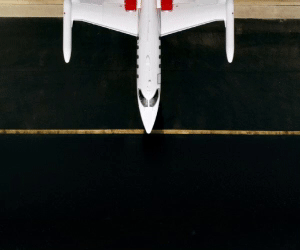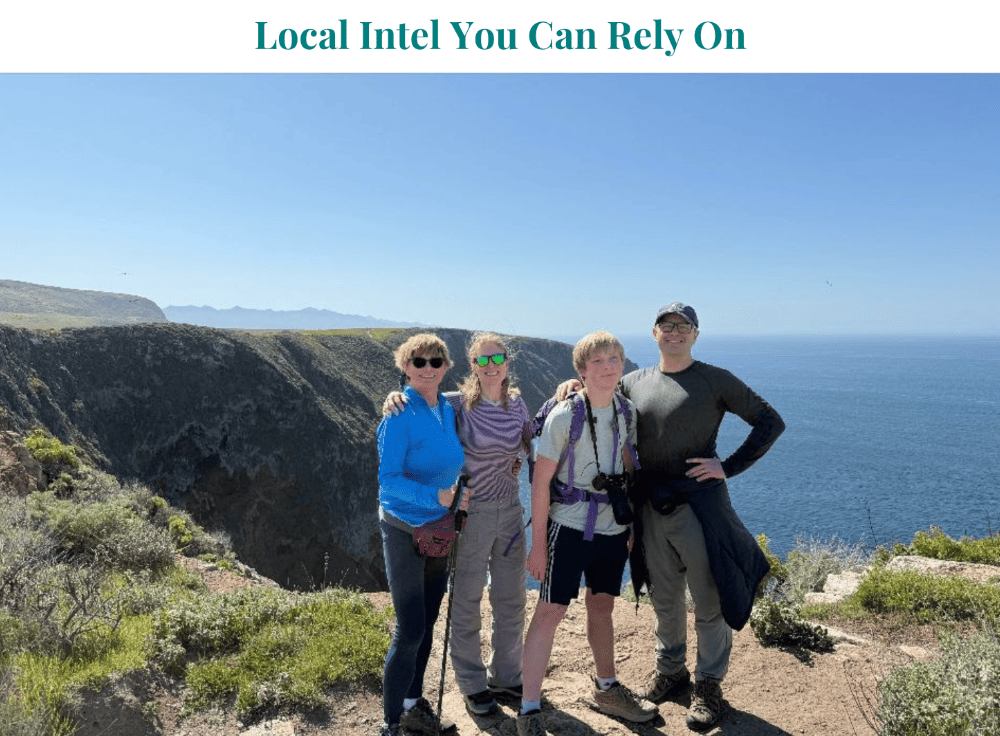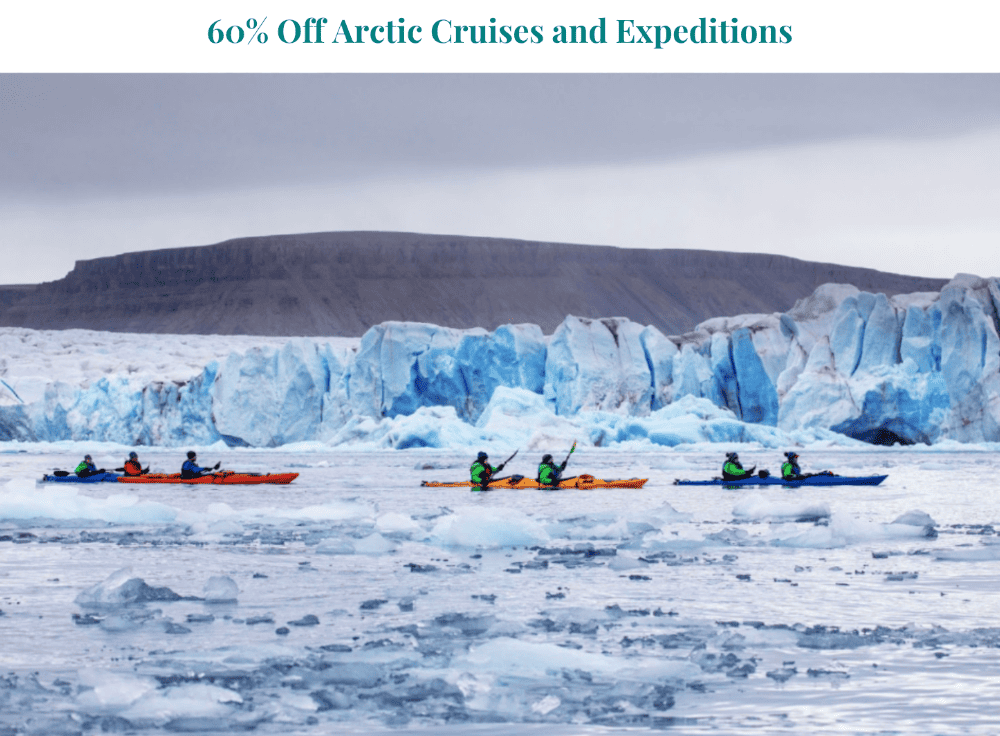Namibia Adventures: Insider’s Guide
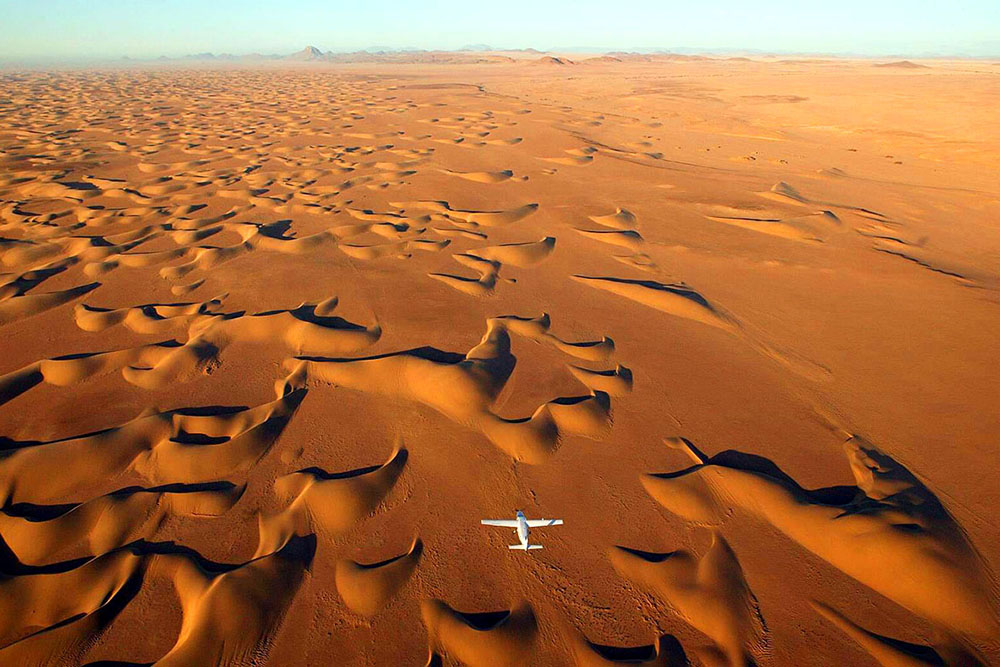 Flying over Namibia's NamibRand Nature Reserve. Photo courtesy Cherri Briggs.
Flying over Namibia's NamibRand Nature Reserve. Photo courtesy Cherri Briggs.
The insider advice on this page is from one of Wendy’s Trusted Travel Experts for southern Africa: Cherri Briggs of Explore Africa.
Cherri—who splits her time between homes in Zambia and Colorado—has spent the past 25 years combing the African continent to create unique travel experiences: canoeing the Zambezi; galloping on horseback with zebra and giraffe across the Okavango Delta; scuba diving off Mozambique; and exploring the remote corners of Ethiopia, Gabon, Madagascar, Cameroon, and the Congo Basin. She and her trusted deputy, Katie McDonough, ensure that clients—both private travelers and groups—enjoy excellent value and a smart selection of lodges and camps in Southern and East Africa. Cherri serves on the boards of several African conservation organizations, and she selects lodges that support local communities and invest in conservation. In 2013 she was appointed Honorary Consul to the USA by the Zambian government, and in 2014 she became the first non-citizen appointed to the Botswana Tourism Organization.
Camps and Lodges
Best-value safari camps
The classic tented camps by Namibian-owned Ultimate Safaris are among Cherri’s moderately priced favorites. Their semi-permanent camps sit in two contrasting, remote areas: Sossusvlei, close to the Great Namib Sand Sea, a spectacular UNESCO World Heritage Site, and the Huab River in the Kunene region, which is the core territory of the highly endangered desert-adapted black rhino. Their Camp Sossus is situated just outside the Neuhof Nature Reserve, one of Namibia’s best areas for spotting wildlife, including leopard and cheetah, zebra, kudu, hartebeest, giraffe, and more. The lodges are relatively basic but very comfortable and environmentally sustainable.
Mowani Mountain Camp and Onguma Tented Camp also provide good value for quality.
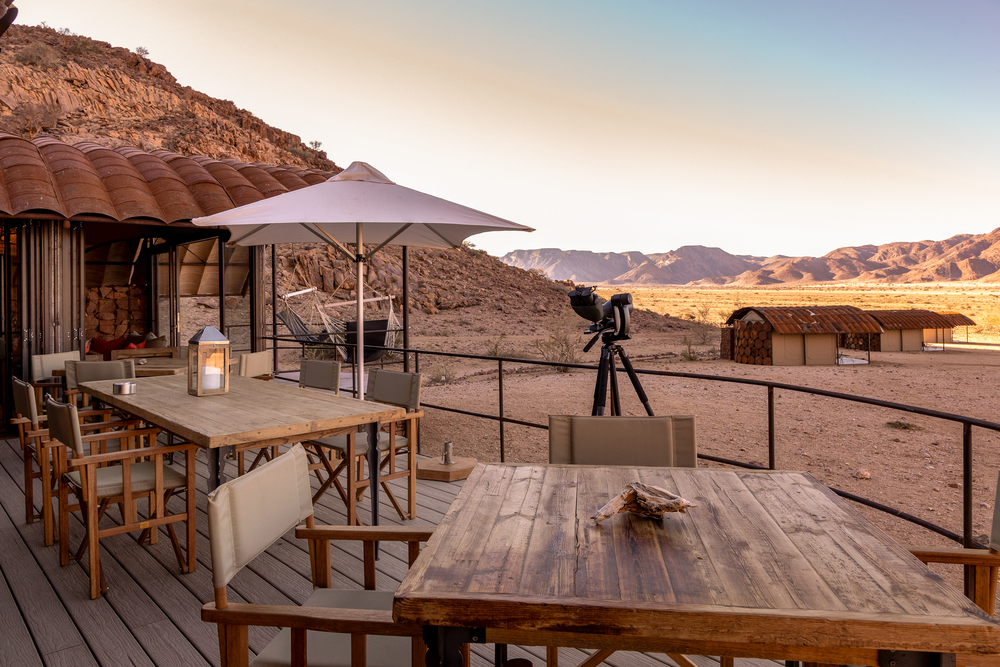
View from Camp Sossus, Namibia. Photo: Ultimate Safaris
Safari camps worth the splurge
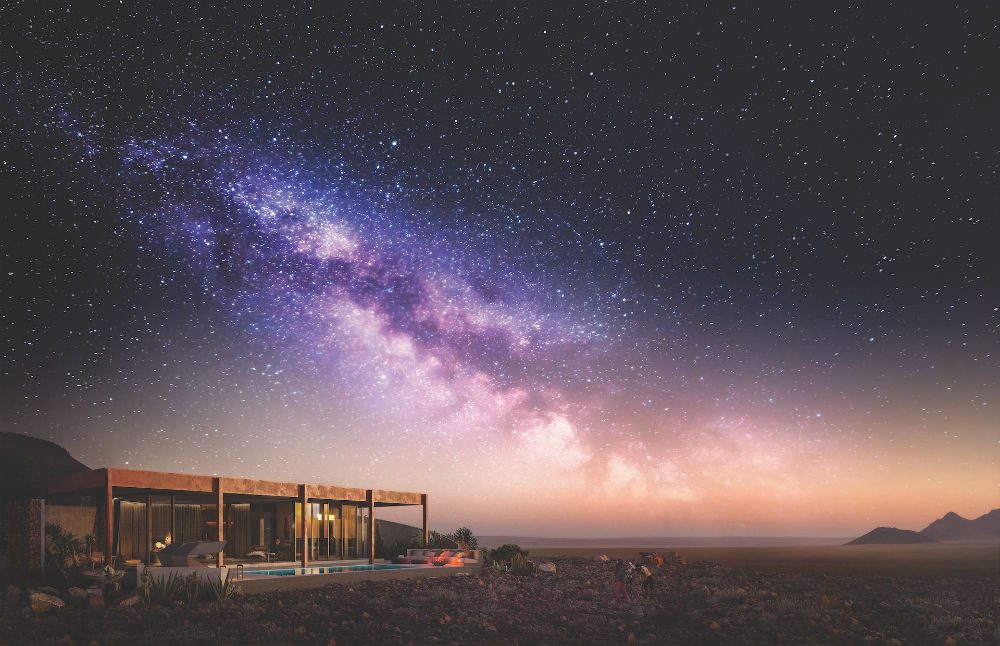
The andBeyond Sossusvlei Desert Lodge has its own astronomer. Photo: andbeyond.com
The ultra-luxurious and spectacularly beautiful andBeyond Sossusvlei Desert Lodge has recently been completely rebuilt and is now the company’s flagship property. Located in Africa’s only International Dark Sky Reserve, this lodge gives you unbeatable night sky views, even before you look through its on-site telescope with the resident astronomer. (Time your trip for the new moon if you can.) Days are full here, beginning in the early morning with hot-air balloon flights over the famed “fairy circles,” still a mystery to scientists. Other activities include quad-biking, wildlife viewing, searching for San (Bushmen) rock art paintings, and of course exploring the colossal dunes in the adjacent Namib-Naukluft National Park.
Where else but in Namibia can you see desert-adapted giraffes, elephants, and a 1,000 fur seals on the same day? To combine the mountainous and stunning landscapes of the Kaokoland region and the Skeleton Coast along the Atlantic Ocean, you need at least two nights (ideally three) in each location. Start at Hoanib Valley Camp, a beautiful boutique hideaway tucked deep within the picturesque mountains of the Kaokoland and overlooking the Hoanib River, offering stunning views across the dusty landscapes where desert-adapted elephant and giraffe roam. You may also have a chance to meet with the fascinating semi-nomadic Himba people, who call this region their home. Then head for the icy, marine-rich waters of the Atlantic. (Swim at your own risk, with a heavy wetsuit!) Shipwreck Lodge’s innovative architecture makes for a dramatic break along the Skeleton Coast’s immense, wind-swept beaches. Each villa evokes the shipwrecks scattered nearby while providing cozy and comfortable accommodations. An excursion to Mowe Bay to visit the famous seal colony is a must, and you can climb over whale bones and shipwrecks on the beach.
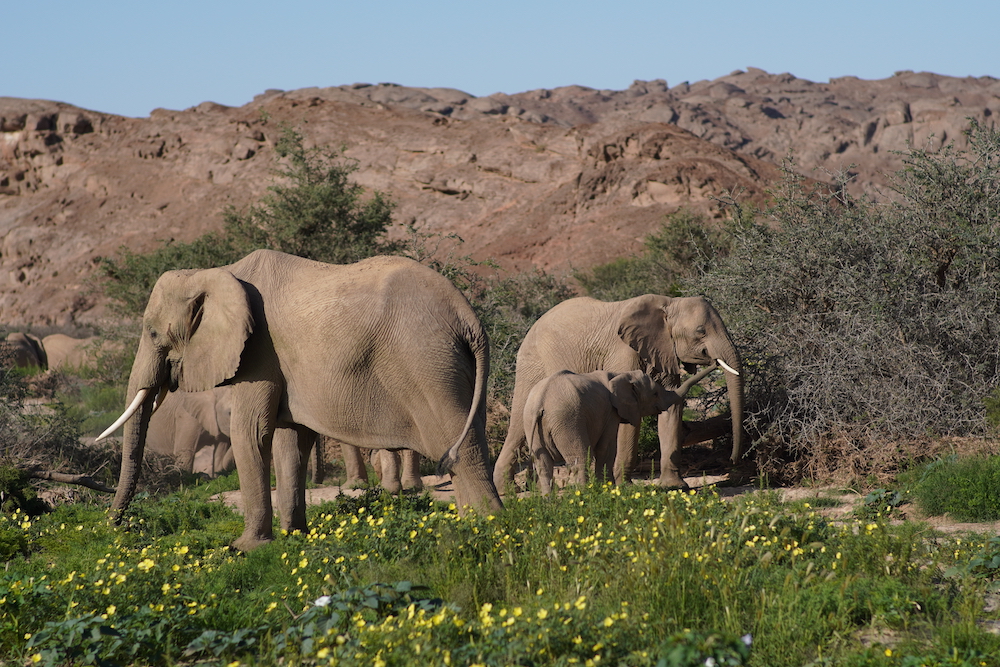
A herd of desert-adapted elephants forage for a meal. Photo: Ryan Damm
Sorris Sorris Lodge is perched atop a rocky outcropping and has jaw-dropping views of the Brandberg Massif and the Ugab River basin. The climate-controlled suites and pool provide luxury and comfort in this remote, desolate environment.
Established on a private concession in the Doro Nawas Conservancy is the luxe Onduli Ridge, a six-suite lodge in the heart of Damaraland and just 20 minutes from the UNESCO World Heritage Site of Twyfelfontein, filled with Stone Age rock carvings and paintings. The area is also home to desert-adapted black rhino, elephant, and predators such as cheetah, leopard, lion, and spotted and brown hyena.
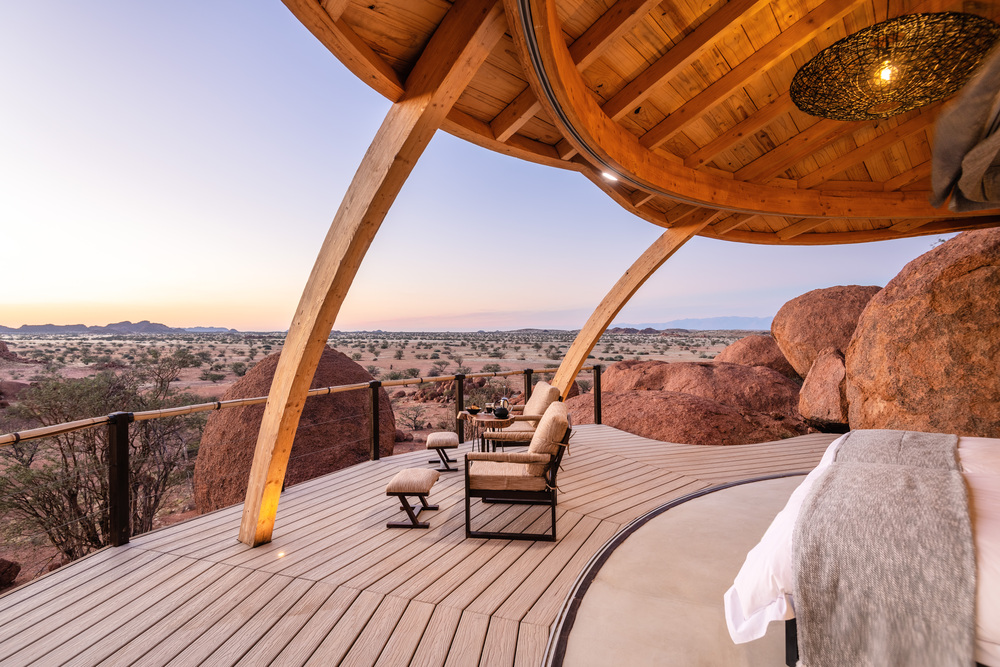
View from the room in Onduli Ridge, Namibia. Photo: Ultimate Safaris
A new option in the extremely remote northern Kunene River region, recently acquired by Sanctuary Retreats and extensively updated to a five-tent boutique property, is Okahirongo River Camp. Here you can take game drives or walks with expert Himba guides to learn about the local residents and absorb the magnificent landscapes. River cruises and village excursions also allow visitors to meet tribal members and learn about their culture.
Best safari accommodation for families
The Nest @ Sossus is a modern-style private villa close to Sossusvlei National Park that offers families a relaxing setting while on safari. They have both a swimming pool and a children’s playground—a win for keeping the kids active after long flights and car rides. The villa sleeps six adults comfortably and has bunk beds in a separate children’s room. Enjoy a sundowner while keeping your eye on the water hole where animals come to quench their thirst. Hot-air ballooning is included in your stay here, along with a private host, chef, butler, naturalist guide, and safari vehicle.
Best for thrill-seekers
White-water rafting down the Kunene River on the Angolan border; the prime time for this varies from year to year but typically falls between June and August.
Rock climbing the bald granite peaks of the famed Spitzkoppe.
Sandboarding on the dunes just outside the coastal city of Swakopmund. No talent required—it’s as easy as sledding. (You can go fat-tire biking here too.) For the highly skilled, the surfing and kiteboarding in Namibia is world-class—but certainly not for the novice.
What to See and Do
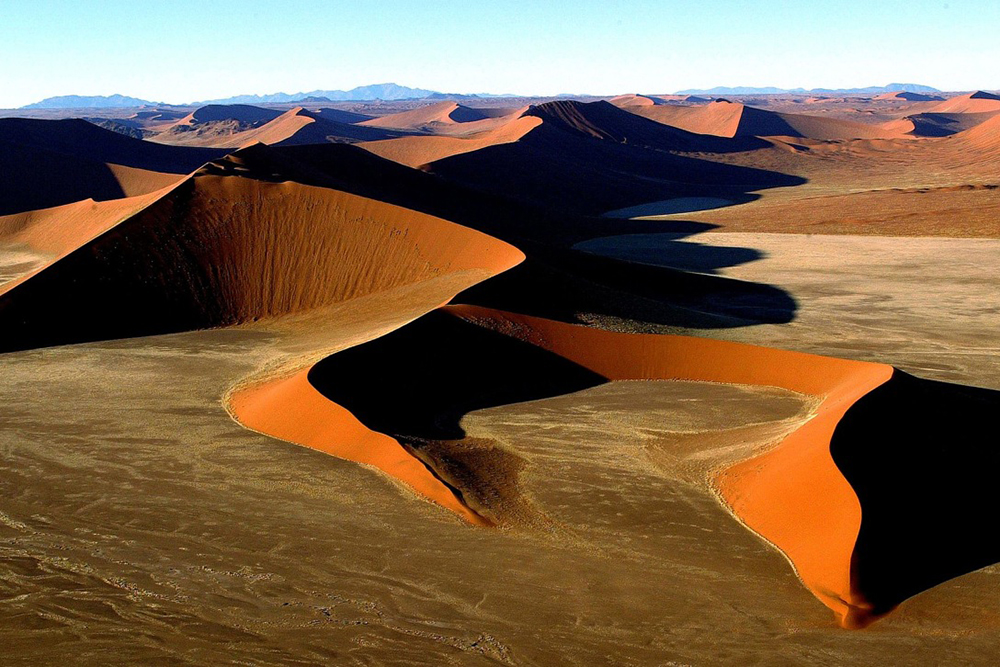
Sossusvlei Dunes, Namibia. Courtesy Cherri Briggs
Don’t miss
The famed Sossusvlei Dunes are a salt and clay pan surrounded by immense red sand dunes in the southern Namib Desert. A stop here is essential for every Namibia itinerary, but Cherri doesn’t do it as everyone else does: She recommends that her travelers stay at Little Kulala for the exclusive use of their private reserve and convenient access to the park; have her arrange a private naturalist guide for your excursions. The park can be bustling by mid-morning, so go as early as possible. Besides the privacy and beautiful morning light, you’ll enjoy a sit-down, fry-up breakfast whipped up by your guide inside the park. Cherri can also arrange night-time excursions to photograph the stars; no other visitors are allowed after sunset.
The hot-air balloon trip at Sossusvlei is a must; soaring above this magnificent landscape in a balloon is mind blowing, and the Champagne breakfast when you land is a special treat.
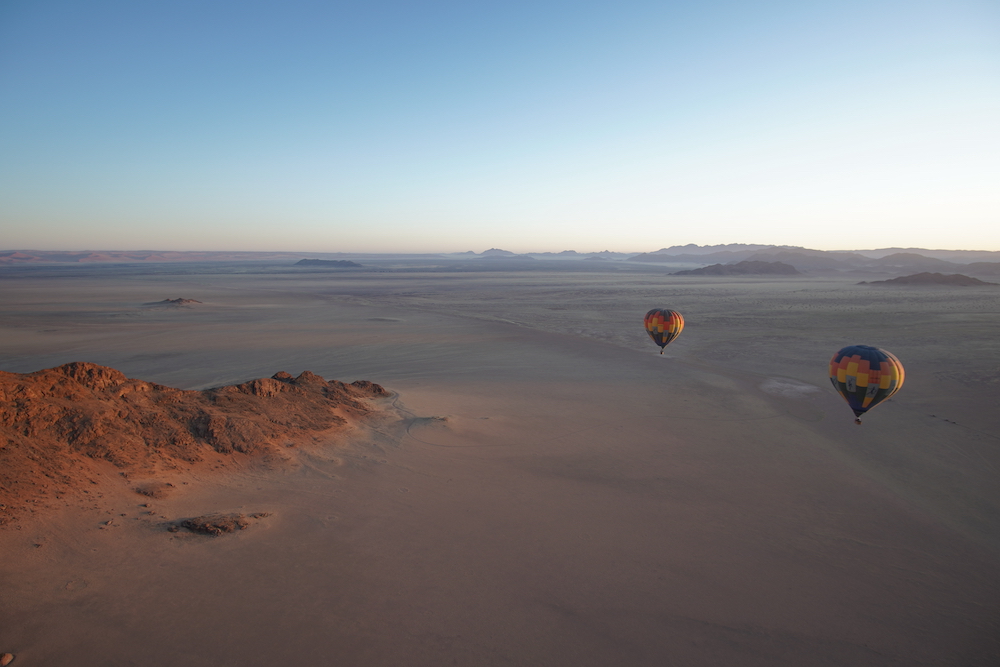
Sunrise ballooning over the Namib Desert. Photo: Ryan Damm
Tracking black rhino on foot; the only population of this critically endangered species thrives in northern Namibia. Along the way, you learn about the difficult task of protecting these magnificent creatures from the rhino horn trade, which is decimating the species.
E-biking is becoming very popular as a new, environmentally friendly activity. Several lodges now have a fleet of e-bikes that guests can use.
Don’t bother
Fish River Canyon, near the country’s southern border, is smaller than the Grand Canyon and thus usually a disappointment to the North American traveler. The time and cost required to get there are difficult to justify in light of the easy access to Fish River’s much “grander” big sister here at home.
Unless you stay at a private concession bordering the park and are guaranteed a great guide, give Etosha National Park a miss. The landscape is exotic and very photogenic, but it can be hard to get your shot if you visit at a busy time of year. (Ask Cherri about best times to go, and avoid South African school holidays.) The government-owned lodges are massive and charmless, and the miles of paved roads can be jammed with tour buses and cars that all converge at water holes.
Bragging rights
Fly over the bleached whale skeletons and rusted shipwrecks along the desolate Skeleton Coast in a vintage fighter plane. There’s no better way to take in Namibia’s otherworldly landscape than from the sky, and this plane allows you to fly low enough to touch the mists rolling in above the Namib Desert. Cherri can arrange for the plane to stay with you for your whole journey as you move between desert camps along the coast.
Learn all about the behaviors, habitat, and threats to rhinos as you track these horned behemoths with a researcher in the remote Damaraland region, wedged between the Kalahari and Namib deserts. You’ll come away with a complete understanding of these complex, compelling, and endangered creatures and photos that will put most others to shame. Cherri can arrange this extraordinary experience for just a day or up to a week, depending on your level of interest.
Cherri can also arrange access to the little-visited, truly authentic Himba villages in the Palmwag concession, where the Himba continue their semi-nomadic way of life. There has been virtually no modern influence on these communities, which makes for a fascinating cultural exchange as you learn about their lifestyle and customs. You will be welcomed as a “friend of a friend,” able to spend considerable time learning the traditional ways of these nomadic pastoralists.
Dishes to try
Surf: You can’t beat the Namibian oysters and juicy white kingklip fillet at The Tug, a classic old waterfront pub in Swakopmund. Or try O’Portuga in Windhoek for an array of seafood options with an Angolan/Portuguese twist.
Turf: Ranching is a big part of Namibia’s economy, so you’ll find no shortage of carnivore options. The sustainably farmed kudu and oryx dishes at Gathemann’s in Windhoek are superb. Joe’s Beer House, a great value and local favorite, also serves great game in a fun, lively atmosphere.
Best Time to Go
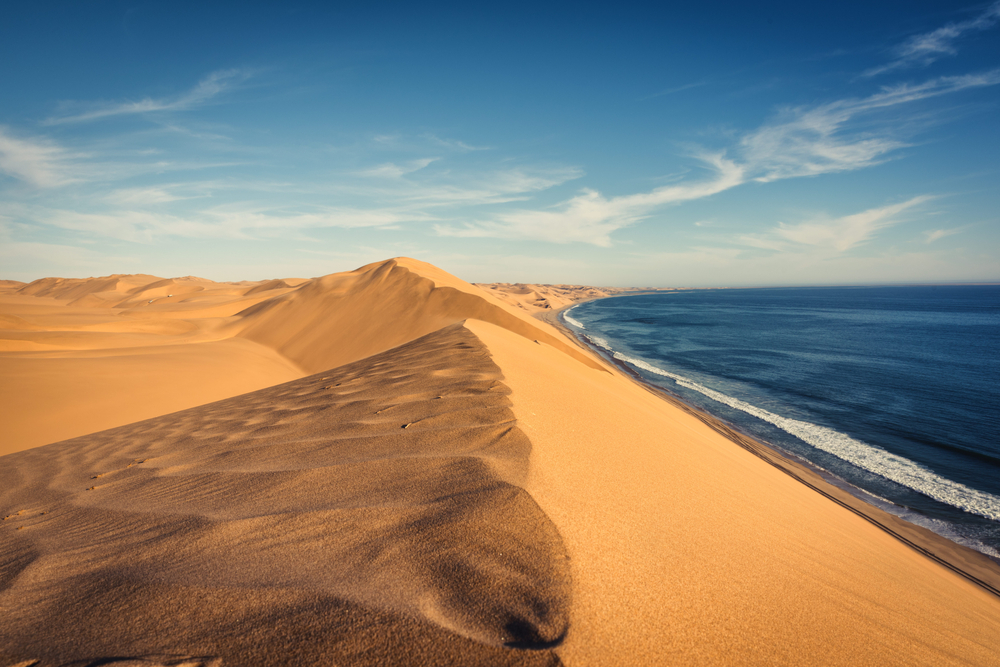
Mid-April through Mid-June, when temperatures are mild night and day, the occasional rains tease the desert wildflowers into bloom, and the animals are fat and happy.
Worst Times to Go
July, when frigid winds from the Atlantic blow hard across the desert, sometimes pulling nighttime temps below freezing (remember, there’s no indoor heating!). November through January is extremely hot and dusty.
Biggest Rookie Mistake
Trying to cover too much ground. Distances between destinations are massive in Namibia, and drives are long and arduous. If money is no object, you can take charter flights. If not, it’s better to spend more time in fewer places.
Can't-Miss Photo Op

The dunes in the Namib Desert change color throughout the day as the sun changes position. Be there at the first hint of sunrise or just before sunset to capture the most brilliant hues.
The Souvenirs
Namibia is deservedly famous for its tourmalines and leather goods. There are several great jewelry stores and leather shops (ostrich bags and wallets, springbok pillow covers) along Windhoek’s Independence Avenue, including Nakara Leather Goods, and Adrian & Meyer or City Gold for jewelry.
Must-Have Apps
Sasol eBirds of Southern Africa, has more than 600 birds and bird calls and makes bird spotting instantly entertaining even for a novice.
The Kingdon Guide to African Mammals. At $15.99, it’s pricey for an app but worth every penny for the in-depth information it provides on wildlife. Your guide will know almost everything; this fills in the gaps.
Airport Intel
For private charters, pay extra to fly into and out of Windhoek International. The small domestic airport, Eros, despite its alluring name, takes at least an hour to reach on the far side of the city.
Don’t count on getting much more than fries and a cola at Namibia’s airports. Best to bring a packed lunch from your lodge.

